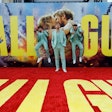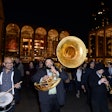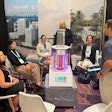
Title: Producer, Events Division, CMJ Network Inc.
What she plans: The CMJ Music Marathon brings together 10,000 attendees from all.phpects of the music industry for panel discussions, a film festival at the New York Hilton and hundreds of performances at more than 50 venues throughout the city—this is where many bands get their start and build their name. She also works on the New Music Monthly Series, which showcases new and developing artists, and two CMJ tours that travel to 25 college campuses.
Age: 33
Staff: Between two and 15 people, depending on what events are happening
Career path: After graduating from Syracuse University with a double major in communications and English, she worked on the Boston Music awards and that city's Fall Fest food and music event before moving to New York to work for Festival Productions internationally on the JVC Jazz Festivals. "I decided I love this—events and music." She's been at CMJ for five and a half years.
Favorite venue: Brooklyn Academy of Music
Favorite hors d'oeuvre: Scallops wrapped in bacon
Where she grew up: Western Massachusetts
Where she lives: Fort Greene, Brooklyn
How do you keep yourself engaged in what you do?
The nice thing about CMJ and the panel discussions is that it's very topical, it's very of the moment. It changes every year so there are always new issues to debate, always a new question on the forefront of where the industry is going. So I can sink my teeth into that and get excited about what we're going to explore. There isn't that sense of doing the same thing over and over. And there's always some new band you're excited about.
What do you think your guests expect and how may those expectations be changing?
They expect to be challenged. That's not changing. They want to participate and be engaged. What's changing is what they're excited about. So it might have been digital downloading two years ago and now maybe they're more interested in the consolidation of media.
How do you keep people excited year after year?
Good programming is always the key. We don't do a lot of food and beverage, so we have to rely on putting good bands in good venues, and put on compelling discussions for topics so people really want to become engaged.
How has the economy affected your job?
We have had to become much more creative with the amount of money, mostly because of the market, in the music industry and the economy in general. But also because we had a big hit in 2001—our event was scheduled for September 13 through 16 and on September 11 we had exhibitions set up, we had bags being stuffed, we were completely in the throes of the last days of planning. So that was a huge setback—all of the infrastructure and set-up costs had to be duplicated to do the event a month later. We have been getting back on track the past couple years, and trying to get to a point where we've made up for what happened.
How do you convince other people that events are still important?
I don't think people have to do a lot of convincing these days because I've seen reports indicating that experiential marketing is at the highest percentage ever and that budgets have gone up and people are using this means of marketing more than they ever have. I feel lucky that this method is coming into its own.
How has the music marathon changed over the years you've been involved?
I was lucky enough to see the coming and going of the dot-com era. That took us on a whirlwind ride of expansion. As the market retracted, I saw us retract in the same way. But it has made us smarter about our business because we know what worked in those situations and we know what was a waste of money. For a while all that mattered was that we were expanding. And now you may be expanding less but you're doing it intelligently and you're spending money in ways you know you can recoup.
Do you look at R.O.I.?
We do a pretty rigorous evaluation process. We measure everything. So if the film festival for example wasn't either creating profit or interest—this is its ninth year—we would stop doing it. We actually have a very close watch on that because it's a smaller portion of our event. We make sure we spend every dime efficiently.
How has technology affected the way you plan events?
We used to have this gigantic paper archive. And now it's all stored on servers and instantly recreatable. It's made the process a lot easier and I think that it's made us all have to work a little harder—we all expect we can do more.
What was the best event you attended this year that you didn't plan?
There is something so unusual and contrary about Coachella [music festival in California]. You have all this edgy music and it's in the most manicured and pristine setting—a polo field. It's surreal.
Do you get to many of the CMJ performances?
I try to go to many of the performances but a lot of times my plans are derailed by some fire that needs to be put out somewhere.
Who is your favorite performer?
One of my more recent favorites is the Polyphonic Spree, a 27-piece choir/band from Texas. Instantly loveable.
—Mark Mavrigian
Posted 05.05.04
Photo by Dan Hallman for BiZBash.
This Q&A originally appeared in our newspaper, the BiZBash Event Style Reporter.
What she plans: The CMJ Music Marathon brings together 10,000 attendees from all.phpects of the music industry for panel discussions, a film festival at the New York Hilton and hundreds of performances at more than 50 venues throughout the city—this is where many bands get their start and build their name. She also works on the New Music Monthly Series, which showcases new and developing artists, and two CMJ tours that travel to 25 college campuses.
Age: 33
Staff: Between two and 15 people, depending on what events are happening
Career path: After graduating from Syracuse University with a double major in communications and English, she worked on the Boston Music awards and that city's Fall Fest food and music event before moving to New York to work for Festival Productions internationally on the JVC Jazz Festivals. "I decided I love this—events and music." She's been at CMJ for five and a half years.
Favorite venue: Brooklyn Academy of Music
Favorite hors d'oeuvre: Scallops wrapped in bacon
Where she grew up: Western Massachusetts
Where she lives: Fort Greene, Brooklyn
How do you keep yourself engaged in what you do?
The nice thing about CMJ and the panel discussions is that it's very topical, it's very of the moment. It changes every year so there are always new issues to debate, always a new question on the forefront of where the industry is going. So I can sink my teeth into that and get excited about what we're going to explore. There isn't that sense of doing the same thing over and over. And there's always some new band you're excited about.
What do you think your guests expect and how may those expectations be changing?
They expect to be challenged. That's not changing. They want to participate and be engaged. What's changing is what they're excited about. So it might have been digital downloading two years ago and now maybe they're more interested in the consolidation of media.
How do you keep people excited year after year?
Good programming is always the key. We don't do a lot of food and beverage, so we have to rely on putting good bands in good venues, and put on compelling discussions for topics so people really want to become engaged.
How has the economy affected your job?
We have had to become much more creative with the amount of money, mostly because of the market, in the music industry and the economy in general. But also because we had a big hit in 2001—our event was scheduled for September 13 through 16 and on September 11 we had exhibitions set up, we had bags being stuffed, we were completely in the throes of the last days of planning. So that was a huge setback—all of the infrastructure and set-up costs had to be duplicated to do the event a month later. We have been getting back on track the past couple years, and trying to get to a point where we've made up for what happened.
How do you convince other people that events are still important?
I don't think people have to do a lot of convincing these days because I've seen reports indicating that experiential marketing is at the highest percentage ever and that budgets have gone up and people are using this means of marketing more than they ever have. I feel lucky that this method is coming into its own.
How has the music marathon changed over the years you've been involved?
I was lucky enough to see the coming and going of the dot-com era. That took us on a whirlwind ride of expansion. As the market retracted, I saw us retract in the same way. But it has made us smarter about our business because we know what worked in those situations and we know what was a waste of money. For a while all that mattered was that we were expanding. And now you may be expanding less but you're doing it intelligently and you're spending money in ways you know you can recoup.
Do you look at R.O.I.?
We do a pretty rigorous evaluation process. We measure everything. So if the film festival for example wasn't either creating profit or interest—this is its ninth year—we would stop doing it. We actually have a very close watch on that because it's a smaller portion of our event. We make sure we spend every dime efficiently.
How has technology affected the way you plan events?
We used to have this gigantic paper archive. And now it's all stored on servers and instantly recreatable. It's made the process a lot easier and I think that it's made us all have to work a little harder—we all expect we can do more.
What was the best event you attended this year that you didn't plan?
There is something so unusual and contrary about Coachella [music festival in California]. You have all this edgy music and it's in the most manicured and pristine setting—a polo field. It's surreal.
Do you get to many of the CMJ performances?
I try to go to many of the performances but a lot of times my plans are derailed by some fire that needs to be put out somewhere.
Who is your favorite performer?
One of my more recent favorites is the Polyphonic Spree, a 27-piece choir/band from Texas. Instantly loveable.
—Mark Mavrigian
Posted 05.05.04
Photo by Dan Hallman for BiZBash.
This Q&A originally appeared in our newspaper, the BiZBash Event Style Reporter.



















